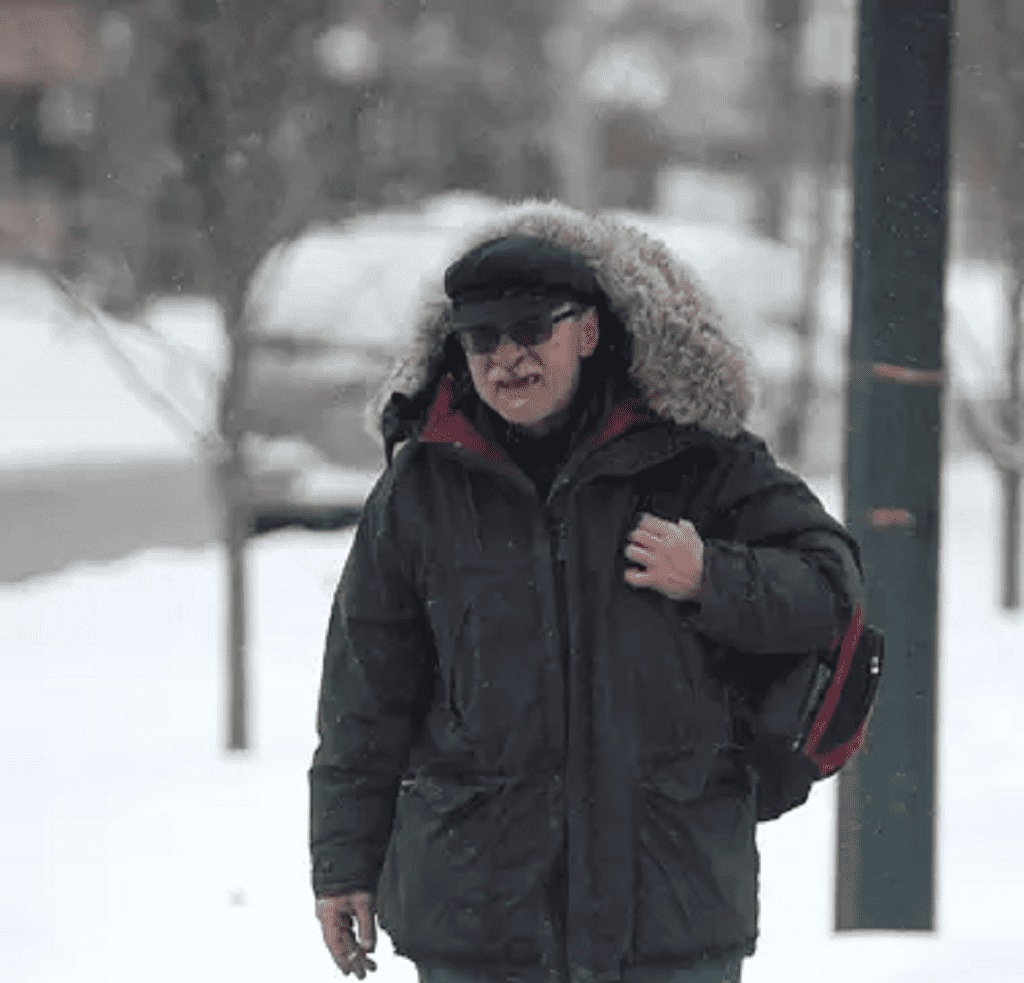Did Madonna's Brother, Anthony Ciccone, Really Freeze to Death?
Rumors have been circulating that Madonna's brother, Anthony Ciccone, has died from exposure to the cold. The claim that he froze to death has raised concerns about homelessness and the struggles faced by those living on the streets.
However, an official confirmation from Madonna or her representatives has not been made. The lack of concrete evidence and conflicting reports have left many unsure of the truth behind these claims.
This article will examine the available information and attempt to establish the facts surrounding Anthony Ciccone's current status. We will also explore the broader issues of homelessness, poverty, and the importance of providing support for those in need.
Fact Check Was Anthony Ciccone
Establishing the facts surrounding Anthony Ciccone's situation is crucial for understanding the complexities of homelessness, poverty, and the challenges faced by individuals living on the streets. Various aspects need to be considered to provide a comprehensive understanding of this issue.
- Homelessness: The lack of adequate housing and shelter for individuals.
- Poverty: The state of having insufficient financial resources to meet basic needs.
- Mental Health: The presence of mental health conditions that can impact an individual's ability to function.
- Addiction: Dependence on substances such as drugs or alcohol.
- Trauma: Past experiences that have resulted in emotional or psychological distress.
- Social Support: The availability of family, friends, or organizations providing emotional and practical assistance.
- Government Policies: Laws and regulations that impact homelessness and poverty.
- Economic Factors: Conditions that affect employment, income, and housing affordability.
- Community Resources: Services and programs available to support individuals experiencing homelessness.
- Personal Circumstances: Unique factors that may have contributed to an individual's situation.
These aspects are interconnected and can influence each other, making it essential to approach the issue of homelessness and poverty holistically. By addressing these underlying factors, we can work towards creating a more just and equitable society where everyone has access to safe and affordable housing.
Homelessness
Homelessness, a pressing issue closely tied to the story of Anthony Ciccone, encompasses a multitude of facets that contribute to its complexity. Understanding these facets is essential for devising effective solutions.
- Lack of Affordable Housing: The scarcity of housing options within reach for low-income individuals and families, often leading to displacement and homelessness.
- Inadequate Shelter Facilities: The shortage of emergency shelters, transitional housing, and supportive services, leaving many homeless individuals without access to safe and stable shelter.
- Mental Health and Addiction: The prevalence of untreated mental health conditions and substance use disorders among homeless individuals, exacerbating their vulnerability and making it harder to secure housing.
These facets intertwine to create a vicious cycle, perpetuating homelessness and its devastating consequences. Addressing these underlying factors requires a comprehensive approach that encompasses affordable housing, accessible healthcare, and supportive services tailored to the specific needs of homeless individuals. Only through such a holistic approach can we hope to alleviate the suffering caused by homelessness and foster a more just and equitable society.
Poverty
Poverty, a pervasive issue closely intertwined with the story of Anthony Ciccone, manifests in multifaceted forms, each contributing to its devastating impact. Understanding these facets is crucial for devising effective solutions to alleviate poverty and its consequences.
- Lack of Economic Opportunities: Limited access to stable employment, decent wages, and job training programs, making it challenging for individuals to earn a sufficient income to meet their basic needs.
- Inadequate Education and Skills: Lack of access to quality education and skills development opportunities, perpetuating a cycle of low-paying jobs and economic insecurity.
- High Cost of Living: The rising cost of housing, healthcare, and other essential goods and services, making it increasingly difficult for low-income individuals to afford basic necessities.
- Discrimination and Prejudice: Systemic barriers faced by marginalized communities, such as racial and gender discrimination, limiting access to employment, housing, and other resources.
These facets of poverty are deeply interconnected, reinforcing each other and creating a formidable obstacle for individuals and families struggling to make ends meet. Addressing these underlying factors requires a comprehensive approach that encompasses economic empowerment, accessible education, affordable housing, and policies that promote equity and inclusion. Only through such a holistic approach can we hope to eradicate poverty and foster a more just and equitable society.
Mental Health
Mental health plays a crucial role in the context of "Fact Check Was Anthony Ciccone", as it can significantly impact an individual's ability to function and make informed decisions. Untreated mental health conditions can exacerbate the challenges faced by homeless individuals, making it harder for them to access resources and improve their situation.
- Cognitive Impairment: Mental health conditions can affect cognitive abilities such as memory, attention, and decision-making, making it difficult for individuals to navigate the complexities of daily life and access services.
- Emotional Distress: Mental health conditions often lead to emotional distress, such as depression, anxiety, or mood swings, which can interfere with an individual's ability to cope with stress, maintain relationships, and engage in self-care.
- Substance Abuse: Mental health conditions and substance abuse often co-occur, with individuals using substances to self-medicate or cope with their symptoms, further complicating their situation and hindering their ability to function.
- Social Isolation: Mental health conditions can lead to social isolation, as individuals may withdraw from social interactions due to stigma, lack of support, or difficulty relating to others.
These facets of mental health highlight the intricate connection between mental well-being and an individual's ability to function effectively. By understanding and addressing the mental health challenges faced by homeless individuals, we can provide more holistic and effective support, ultimately helping them rebuild their lives.
Addiction
Addiction, a complex and multifaceted condition, plays a significant role in the context of "Fact Check Was Anthony Ciccone." Substance abuse often co-occurs with mental health conditions and homelessness, creating a vicious cycle that can be challenging to break.
Addiction can exacerbate the challenges faced by homeless individuals in several ways. Substance use can impair cognitive functioning, making it difficult to make sound decisions and access services. It can also lead to physical health problems, further complicating an individual's situation. Additionally, addiction can strain relationships and lead to social isolation, making it harder for individuals to seek support.
Real-life examples of the connection between addiction and homelessness are prevalent. Many homeless individuals have struggled with substance abuse at some point in their lives. For instance, Anthony Ciccone, the brother of Madonna, has reportedly struggled with alcoholism and homelessness. His story highlights the devastating impact that addiction can have on an individual's life.
Understanding the connection between addiction and homelessness is crucial for developing effective interventions. By addressing the underlying causes of addiction and providing accessible treatment and support services, we can help homeless individuals break the cycle of addiction and rebuild their lives. This understanding also informs policy decisions and resource allocation, ensuring that individuals with substance use disorders have access to the help they need.
Trauma
Within the context of "Fact Check Was Anthony Ciccone," understanding the role of trauma is essential. Trauma, encompassing emotionally and psychologically distressing past experiences, can profoundly impact individuals' lives and contribute to their current circumstances.
- Childhood Trauma: Adverse experiences during childhood, such as abuse, neglect, or witnessing violence, can have lasting effects on an individual's mental health and well-being.
- Relationship Trauma: Traumatic experiences within intimate relationships, involving emotional, physical, or sexual abuse, can lead to feelings of betrayal, low self-esteem, and difficulty trusting others.
- War and Conflict Trauma: Exposure to war and conflict can result in severe psychological distress, including post-traumatic stress disorder (PTSD), anxiety, and depression.
- Community Trauma: Individuals who have experienced community-wide traumas, such as natural disasters or mass shootings, may suffer from psychological distress and a sense of collective loss or grief.
These facets of trauma highlight the diverse and complex ways in which past experiences can shape an individual's present reality. By recognizing and addressing the potential impact of trauma on homeless individuals like Anthony Ciccone, we can develop more compassionate and effective interventions that promote healing and recovery.
Social Support
Within the context of "Fact Check Was Anthony Ciccone," social support plays a crucial role in understanding the challenges and complexities faced by individuals experiencing homelessness. The presence or absence of supportive relationships can significantly impact an individual's ability to cope with adversity, access resources, and improve their situation.
- Emotional Support: Family, friends, or support groups can provide a sense of belonging, validation, and emotional comfort, which is particularly important for individuals experiencing homelessness who may feel isolated and alone.
- Practical Assistance: Supportive individuals or organizations can offer practical assistance, such as providing meals, shelter, transportation, or help with job searches, alleviating the daily challenges faced by homeless individuals.
- Advocacy and Empowerment: Social support can extend to advocacy and empowerment, where individuals are supported in navigating complex systems, accessing services, and fighting for their rights, promoting self-sufficiency and resilience.
- Stigma Reduction: Supportive relationships can help reduce the stigma associated with homelessness, creating a more inclusive and understanding environment where individuals feel comfortable seeking help and rebuilding their lives.
In the case of Anthony Ciccone, the lack of strong social support may have contributed to his struggles with homelessness. Without a stable network of family or friends to rely on, he may have faced greater challenges in accessing resources and improving his situation. Understanding the importance of social support highlights the need for interventions that focus on building and strengthening these relationships, empowering homeless individuals to break the cycle of homelessness and rebuild their lives.
Government Policies
Government policies play a significant role in shaping the landscape of homelessness and poverty. Laws and regulations that address housing affordability, income support, and access to essential services can have a profound impact on the lives of those experiencing homelessness, including individuals like Anthony Ciccone.
Inadequate government policies can exacerbate homelessness and poverty by limiting the availability of affordable housing, restricting access to healthcare and other essential services, and failing to provide sufficient income support for those in need. For example, strict zoning laws and rent control regulations can make it difficult to build new affordable housing units, leading to a shortage of housing options for low-income individuals and families.
On the other hand, well-designed government policies can help to reduce homelessness and poverty by increasing the supply of affordable housing, expanding access to healthcare and other essential services, and providing financial assistance to those in need. For example, government programs that provide rental assistance or subsidies for low-income individuals and families can help to make housing more affordable and prevent homelessness.
Understanding the connection between government policies and homelessness and poverty is crucial for developing effective solutions to these complex issues. By advocating for policies that promote affordable housing, income equality, and access to essential services, we can help to create a more just and equitable society where everyone has a place to call home.
Economic Factors
Economic factors play a significant role in shaping the landscape of homelessness and poverty, and their connection to the issue of "Fact Check Was Anthony Ciccone" is undeniable. These factors, such as employment opportunities, income levels, and housing affordability, can have a profound impact on an individual's ability to secure stable housing and escape the cycle of homelessness.
For instance, a lack of well-paying employment opportunities can make it difficult for individuals to afford housing, leading to increased rates of homelessness. Similarly, rising housing costs and stagnant wages can put a strain on low-income households, making them more vulnerable to displacement and homelessness.
The case of Anthony Ciccone highlights the real-life impact of economic factors on homelessness. As a struggling artist, Ciccone faced challenges in securing stable employment and maintaining a steady income. These economic difficulties, coupled with personal struggles, contributed to his homelessness and the subsequent media attention surrounding his situation.
Understanding the connection between economic factors and homelessness is crucial for developing effective solutions. By addressing issues such as income inequality, affordable housing, and job creation, we can create a more equitable society where everyone has a fair chance to secure stable housing and improve their quality of life.
Community Resources
Community resources play a pivotal role in addressing the challenges faced by individuals experiencing homelessness, including those exemplified by the case of Anthony Ciccone. These services and programs provide essential support, aiming to alleviate the underlying causes of homelessness and empower individuals to rebuild their lives.
One of the most critical aspects of community resources is the provision of shelter and housing assistance. Emergency shelters offer temporary refuge from the streets, while transitional housing programs provide longer-term support, helping individuals stabilize their living situation and work towards permanent housing. Additionally, housing assistance programs can assist with rent payments, security deposits, and other expenses associated with securing and maintaining stable housing.
Beyond shelter, community resources offer a wide range of services tailored to the specific needs of homeless individuals. These may include healthcare services, mental health counseling, substance abuse treatment, job training programs, and legal assistance. By addressing the underlying issues that contribute to homelessness, these services aim to empower individuals to overcome barriers and achieve self-sufficiency.
The availability and accessibility of community resources are crucial for effective homelessness prevention and intervention. Governments, non-profit organizations, and community groups must collaborate to ensure that these services are adequately funded and accessible to all who need them. By investing in community resources, we can help individuals like Anthony Ciccone break the cycle of homelessness and rebuild their lives with dignity and stability.
Personal Circumstances
Within the context of "Fact Check Was Anthony Ciccone," personal circumstances encompass unique factors that may have influenced Anthony Ciccone's life trajectory and contributed to his homelessness. Exploring these circumstances provides a nuanced understanding of the complexities faced by individuals experiencing homelessness.
- Childhood Trauma: Adverse experiences during childhood, such as abuse or neglect, can have lasting effects on an individual's mental health and well-being, increasing the risk of homelessness later in life.
- Mental Health Conditions: Untreated mental health conditions, such as depression or anxiety, can impair an individual's ability to function effectively, making it difficult to maintain stable housing and employment.
- Addiction: Substance abuse can lead to a downward spiral, affecting physical and mental health, damaging relationships, and hindering an individual's ability to secure and maintain housing.
- Lack of Social Support: The absence of a supportive network of family and friends can leave individuals vulnerable to homelessness, as they lack the emotional and practical assistance needed to navigate life's challenges.
These personal circumstances highlight the intricate interplay of factors that can contribute to homelessness. By recognizing and addressing these unique circumstances, we can develop more effective interventions and support systems that empower individuals like Anthony Ciccone to rebuild their lives and escape the cycle of homelessness.
The exploration of "Fact Check Was Anthony Ciccone" reveals a complex interplay of personal circumstances, societal factors, and a lack of support systems that can contribute to homelessness. The article highlights the importance of addressing underlying issues such as mental health conditions, addiction, and trauma to break the cycle of homelessness. It also emphasizes the need for accessible and affordable housing, adequate income support, and community resources to empower individuals to rebuild their lives.
Two main points emerge from the article: firstly, homelessness is a multifaceted issue that requires a comprehensive approach addressing both individual and systemic factors. Secondly, providing support and resources to those experiencing homelessness is crucial for their recovery and successful reintegration into society. The case of Anthony Ciccone serves as a reminder that anyone can become homeless, and it is our collective responsibility to create a society where everyone has access to safe and stable housing.
Song Seung Heon: The South Korean Heartthrob
Marion Donovan S Biography Net
Colton Haynes Biography Age Family



ncG1vNJzZmilkaPBtriQZ5imq2NjsaqzyK2YpaeTmq6vv8%2Bamp6rXpi8rnvFmpqtZZOdsqS3jLCYrGWRo8Gpu82yZJyhk5i8r7GNoaumpA%3D%3D